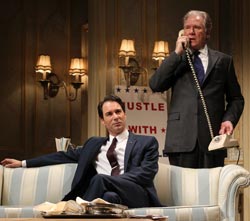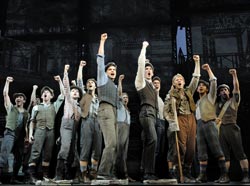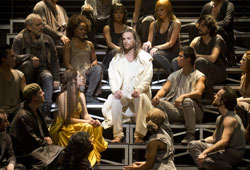Category: "Broadway"
Review: Gore Vidal's The Best Man
Apr 2nd

You may be wondering why Gore Vidal’s politically-themed drama The Best Man needed another revival a mere twelve years after its last Broadway outing. The better question is why hasn’t it been done in the interim, considering that we’ve had endured several highly contentious elections? Fortunately, it can now be seen in a wildly entertaining, star-studded production with the newly possessory title Gore Vidal’s The Best Man.
While this 1960 play is dated in some of its details—although not by much, considering how much talk there’s been lately about a possible brokered Republican convention—its portrait of political chicanery could not be more contemporary.
What makes the play work so well more than a half-century after it premiered is its crackling dialogue, which produces more laughs than most outright comedies. And while contemporary audiences are less likely to spot the obvious parallels between its characters and such historical figures as Nixon, Kennedy and Adlai Stevenson, they’ll certainly recognize the venality and ruthlessness on display.
The plot concerns the battle between two candidates for their party’s 1960 presidential nomination just before and during a convention. The opponents are William Russell (John Larroquette), a highly principled, intellectual Secretary of State with a propensity for womanizing, and the young, handsome Senator Joseph Cantwell (Eric McCormack), who will use any methods at his disposal to smear his opponents.
And he has a real smoking gun to use against Russell, in the form of a confidential medical report detailing a past nervous breakdown and psychological problems. So when Cantwell’s former army buddy (Jefferson Mays) shows up with information apparently proving a past homosexual dalliance, Russell is faced with the ethical dilemma or whether or not to use it in retaliation.
Spurring him on to counterattack with full force is the plain-talking, former President Hockstader (James Earl Jones), who keeps both men guessing as to who he’ll finally endorse.
Other characters figuring in the past-paced action include Russell’s loyal wife Alice (Candice Bergen), willing to put up appearances even though the marriage is all but over; political grande dame Sue-Ellen Gamadge (Angela Lansbury), who’s seen it all; Russell’s loyal campaign manager (Michael McKean) and Cantwell’s flighty, Southern belle wife (Kerry Butler).
Director Michael Wilson’s atmospheric production has the theater festooned with political banners, television screens showing fake news footage; and a commentator delivering his broadcasts from one of the side boxes.
More importantly, he delivers a fast-paced, galvanizing staging that features one of the best ensemble casts seen on Broadway in recent years. This all-star assemblage of superb performers produces a visceral excitement, and for the most part they don’t disappoint. The old pros Jones and Lansbury show that they can still command the stage in their eighties, with the former particularly powerful as the dying ex-president; Larroquette, usually seen in smarmier roles, is very effective as the principled, joke-cracking Russell; a de-glamorized Bergen is touchingly sympathetic as the publicity-averse wife; and McCormack, although not quite convincing at first, gets stronger as the evening progresses. And veteran character actor Dakin Matthews makes the most of his brief scenes as a befuddled senator.
This is a superb revival of a play that only seems to get more and more relevant every four years. It should be mandatory viewing before Election Day.
Gerald Schoenfeld Theatre, 236 W. 45th St. www.thebestmanonbroadway.com. Through July 8.
Review: Newsies
Mar 30th

It’s a hard knock life for the newsboys in Newsies, the stage adaptation of the flop 1992 Disney musical film that has become a cult favorite. When the ragtag group of orphans and runaways burst into exuberant song and dance, it’s hard not to think of Annie. Heck, there’s even a Roosevelt—in this case Teddy, not FDR—who arrives to save the day.
Featuring much of the original Alan Menken/Jack Feldman score as well as new tunes by the same composers, the musical--arriving on Broadway after a well-received tryout at New Jersey’s Paper Mill Playhouse--boasts a book by Harvey Fierstein. It is officially billed as a limited engagement, with an extension already announced. But don’t be surprised if it sticks around the Great White Way for a long time to come.
The tale’s hero is Jack Kelly (Jeremy Jordan), the leader of the newsboys who organizes a strike against Joseph Pulitzer (John Dossett) when the publisher raises their distribution price. Jack dreams of leaving the tough streets of the city and heading west to Santa Fe, but he begins to think differently when he meets spunky reporter Katharine (Kara Lindsay), a love interest who wasn’t a character in the film.
Very much a standard issue Disney musical in its sentimentality, formulaic characters—Pulitzer is depicted as a practically moustache twirling villain—and predictable plotting, the show is redeemed by its terrific musical numbers. Such songs as “Carrying the Banner,” “Seize the Day” and “King of New York” feature rousing choreography by Christopher Gattelli in which the newsies athletically flip, spin, and tap dance across the stage and into our hearts.
Unfortunately, Fierstein’s book is strictly paint by numbers, featuring tired jokes and button-pushing emotional sentiments.
Director Jeff Calhoun keeps the show moving in admirably fast-paced fashion, but his efforts are sometimes undercut by the clunky, massive set, composed of metal scaffolding, platforms and stairways that are constantly being moved about.
In the lead role played by the young Christian Bale in the film, Jordan proves a knockout. Seemingly undaunted by the crash-and-burn of his debut Broadway starrer Bonnie & Clyde, the charismatic young actor boasts talent to spare--his impassioned acting and soaring vocals provide real heart and soul to what could have just been another mechanical Disney enterprise.
Nederlander Theatre, 208 W. 41st St. 800-745-3000. www.ticketmaster.com. Through Aug. 19.
Review: Jesus Christ Superstar
Mar 23rd

Jesus Christ Superstar, which began its life as a concept album, has always been more fun to listen to than actually watch. But the new Broadway revival--imported from the Stratford Shakespeare Festival by way of the La Jolla Playhouse—is a galvanizing rendition that grips from first moment to last. Staged in propulsive fashion by Des McAnuff, who has no small experience with this sort of material (Jersey Boys, The Who’s Tommy), the production is something to shout hallelujah about.
Short of the bloated, high-concept gimmickry that afflicted the show’s last Broadway outing, this is a lean and mean, stripped-down version that eschews camp. It concentrates appropriately and thrillingly on the sung-through pop/rock score by Andrew Lloyd Webber and Tim Rice which is more and more beginning to seem their best.
There’s an appropriate pre-show announcement that gets a laugh. It informs people to feel free to open their wrapped hard candies at any point, since the music will drown out the sound. And so it does under Rick Fox’s musical direction, which features both the volume and the high energy to put across the score with maximum impact. Steve Canyon Kennedy’s sound design, which at several points employs surround-sound effects that have audience members swiveling in their seats, is another plus.
The action is staged on a simple set (designed by Robert Brill) that largely consists of metal scaffolding; movable stairways and ladders; and ticker-tape style LCD displays. It’s a cliché, sure, but it works perfectly here, keeping the focus on the actors and instilling the proceedings with a suitably timeless feel.
The performers infuse their vocals with a powerful urgency, and their acting is impressive as well. Paul Nolan is an intriguingly ambiguous, complex Jesus; Chilina Kennedy a sympathetic and appealing Mary Magdalene; and Tom Hewitt a properly sinister but not cartoonishly villainous Pontius Pilate. At the reviewed performance, understudy Jeremy Kushnier played Judas (filling in for Josh Young), but there was absolutely no tentativeness evident in his riveting, dynamically sung portrayal.
Also terrific are Bruce Dow, bringing a welcome edge to the usually comic King Herod, and Marcus Nance, whose deep-voiced Caiaphas is spine-tingling.
Lisa Shriver’s energetic choreography keeps the proceedings moving at a fever pitch, while McAnuff’s uncommonly lucid staging is consistently striking, especially in the climactic Crucifixion sequence in which Judas returns as a shiny-suited, Evangelical-style preacher.
To quote one of the show’s more memorable numbers, “Hosanna” to this revival which stirs the sort of excitement that must have been felt upon its 1971 Broadway premiere.
Neil Simon Theatre, 250 W. 52nd St. 877-250-2929. www.ticketmaster.com.
Review: Death of a Salesman
Mar 16th

Whenever there’s a new revival of Death of a Salesman people marvel at the fact that it seems so newly relevant. But it’s not that society is changing but rather that Arthur Miller’s 1949 masterpiece, now receiving a triumphant Broadway production directed by Mike Nichols, is so timeless.
There was some question about the necessity for this revival, coming relatively soon after the acclaimed 1999 production starring Brian Dennehy. And the casting of 44-year-old Philip Seymour Hoffman as the 62-year-old Willy Loman seemed dubious, despite the fact that the play’s original star, Lee J. Cobb, was a mere 37 when he essayed the role.
But any doubts are immediately erased by this shattering revival, which marks a major return to form for its legendary director after his disappointing production of The Country Girl a few years back.
The play itself is nearly indestructible, with Miller’s groundbreaking combination of harsh naturalism and poetic illusion registering as powerfully today as it did upon its premiere. And this production harkens back to the original in significant ways, reprising the original groundbreaking set design by Jo Mielziner as well as the haunting background music by Alex North, who would go on to write the scores for such films as A Streetcar Named Desire, Spartacus and dozens of others.
Mielziner’s set, comprised of the skeleton of the Loman’s Brooklyn home and a minimum of props, skillfully allows for the use of lighting and projections to infuse the proceedings with a dreamlike, cinematic feel that conveys Willy’s flights between reality and fantasy, the past and the present. Seeing it come to life feels like a trip into theatrical history.
From the opening moment--when Hoffman’s lumbering Willy wearily drops his sample cases onto the kitchen floor--to the shattering final scene in the graveyard, Nichols’ production doesn’t make a single false step.
Hoffman, whose ample physique makes him appear older than he is, is a shattering Willy, perhaps the most vulnerable ever. Unlike Dustin Hoffman, who projected a bantamweight feistiness, and Dennehy, with his intimitading physical presence, his Willy is a relentlessly pitiful, tragic figure. But the actor also beautifully captures the humor of the role--the way that Willy’s quick-silver contradictions reflect not just his crumbling mind but also his stubbornly self-defeating personality.
Linda Emond, also playing older than she is, is deeply moving as the wife, Linda, investing even the character’s most familiar speeches with fresh emotional immediacy. British actor Andrew Garfield, making his Broadway debut after wowing film audiences in The Social Network (and just prior to his taking over for Tobey Maguire in the Spider-Man film reboot), is superb as the oldest son Biff, whose emotional self-realization at the end of the play is its pivotal scene. And unlike many English actors playing New Yorkers, he thankfully doesn’t overdo his accent.
Everyone in the supporting cast is sublime: Fran Wittrock, joyfully energetic as Happy, the other “Adonis son”; Bill Camp, beautifully understated as Charley, the best friend who offers Willy a lifeline that the proud salesman refuses to accept; John Glover, floridly melodramatic as Ben, Willy’s brother who haunts him with the misery of missed opportunities; and Fran Krinz, versatile as Bernard, the nerd who grows up to be lawyer appearing before the Supreme Court.
Yes, you’ve seen Salesman before. And the play is definitely not light-hearted entertainment (although it does feature surprisingly humorous moments). But when a production this well acted and staged comes along, attention must be paid.
Ethel Barrymore Theatre, 243 W.47th St. 212-239-6200. www.Telecharge.com. Through June 2.
Review: Carrie
Mar 2nd

The original musical version of Carrie was a notorious flop upon its 1988 Broadway premiere--it closed after five performances at a loss of millions of dollars, nearly destroyed the reputation of the Royal Shakespeare Company, and was so ignominious in its failure that it lent its name to author Ken Mandelbaum’s now classic tome about Broadway musical disaster, Not Since Carrie.
Now it’s back, in a dramatically retooled and reconceived off-Broadway revival that attempts to strip away its camp excesses. But while the production generally succeeds in this aspiration, there’s an unfortunate side effect. It’s now simply dull.
Fans of Stephen King’s novel and Brian DePalma’s hit film adaptation are familiar with the story of Carrie White, the unfortunate high school wallflower with lethal telekinetic powers. Lawrence D. Cohen’s book for the musical is generally faithful to the source material, including such iconic moments as the blood-drenched prom and Carrie’s fateful final encounter with her religious fanatic mother. In what is perhaps a reflection on society’s current focus on the horrific effects of teen bullying, that aspect of the storyline is emphasized here to such a degree that Carrie sometimes feels like a supporting character. The attempt at psychological realism is understandable, but it results in an overall blandness that flattens the outlandish proceedings.
Director Stafford Arima takes a far more streamlined approach to the material than did Terry Hands in the big-budgeted original production, which featured lavish sets, bizarre production numbers, overblown special effects and buckets and buckets of fake blood. This scaled-down rendition relies mostly on lighting, projections and sound effects to convey the violent mayhem to generally impressive effect. The fact that not a drop of blood is used onstage is indicative of the overall restraint.
But the fact remains that the story, like most gothic tales, doesn’t particularly lend itself to musical treatment. And with the exception of “When There’s No One,” a haunting second act ballad sung by Carrie’s mother, the score by Michael Gore and Dean Pitchford (whose biggest claim to fame is the movie Fame) is generic, unmemorable pop-rock.
Molly Ransom is touching as Carrie, although she’s never quite as vulnerable or scary as the role demands. And as the obsessed Margaret, Marin Mazzie mainly seems miscast, failing to project the ferociousness that Piper Laurie and Betty Buckley respectively brought to the film and Broadway versions. She ultimately seems less scary than a typical Rick Santorum supporter.
This version of Carrie is certainly viable, and its name recognition should ensure that it gets produced in smaller theaters for a long time to come. But no amount of tinkering will ever make it a successful musical.
Lucille Lortel Theatre, 121 Christopher Street. 212-352-3101. www.mcctheater.org. Through April 22.